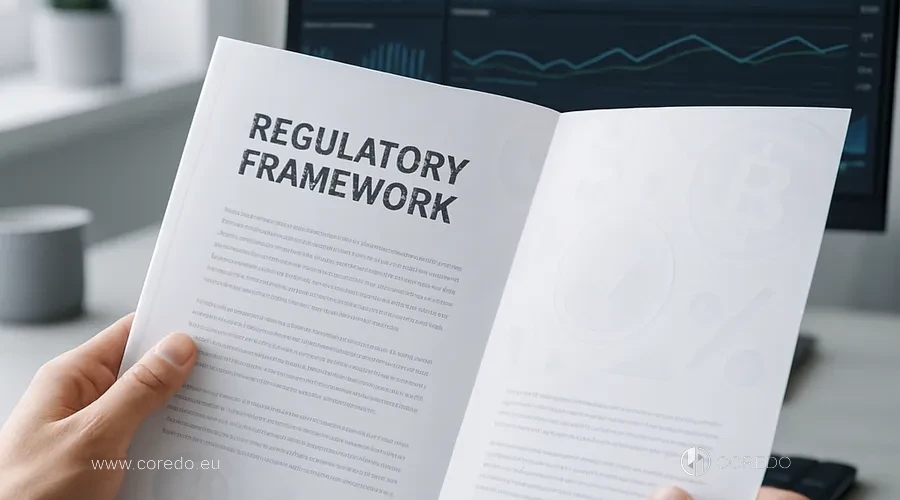Entrepreneurs from Europe, Asia and the CIS face a number of pain points: difficulties with company registration, opening a bank account, complying with Finantsinspektsioon requirements, as well as a lack of reliable partners able to support the entire process from registration to obtaining a license.
Why Estonia for a crypto license in 2026?

Why Estonia, the optimal choice for a crypto license in 2026, is becoming increasingly clear to companies seeking to operate to international standards and grow within the legal field. The Estonian jurisdiction combines progressive cryptocurrency regulation with unique business advantages, which we will review below.
Advantages of Estonia for crypto businesses
Registering a CASP (Crypto Asset Service Provider) in Estonia allows you to legally carry out cryptocurrency operations, including exchange, custody, trading and other services, with EU passporting. This means that a company that has obtained a crypto license in Estonia can operate in other EU countries without needing to obtain additional licenses.
Estonia’s digital infrastructure, including e-Residency, enables remote company management, which is especially relevant for international entrepreneurs.
Advantages for businesses in the EU, Asia and the CIS
- EU passporting of the license: The ability to operate in other EU countries based on the Estonian license.
- Access to European banks and payment systems: Opening a corporate bank account, integration with EMI/PSP payment systems.
- Attractiveness to investors: Estonia’s reputation as a reliable jurisdiction attracts investors from developed markets.
- The ability to work with clients from Asia and the CIS: When complying with local requirements, a company can scale into Asian and CIS markets.
- ROI metrics: Rapid return on investment due to scalability and regulatory leniency.
How to obtain a crypto license in Estonia

Obtaining a crypto license in Estonia is a comprehensive process that requires compliance with strict regulatory requirements and the sequential completion of several stages. The step-by-step guide below will reveal all the key steps you need to take, starting with company registration and ending with obtaining official authorization to operate with cryptocurrencies. Understanding this process will help you avoid mistakes and speed up the licensing procedure.
Preparation and planning
Before starting company registration it is important to determine the types of activities that will be carried out: exchange of cryptocurrencies for fiat, custody of assets, trading, etc.
- Choosing and checking the company name in the commercial register: the name must be unique and comply with the regulator’s requirements.
- Collecting information about founders, beneficial owners and managers: full details of all company participants must be provided.
- Developing a detailed business plan:
- Business model and sources of revenue.
- Security plan and technical infrastructure.
- Measures for AML/CTF compliance.
- Risk management strategy.
Company registration in Estonia
| Requirement | Description | Note |
|---|---|---|
| Minimum share capital | 12 000 euros | Must be deposited into the company’s bank account |
| Founders | At least one shareholder of any nationality | Registration via e-Residency is possible |
| Registered address | A physical office in Estonia | Required to comply with regulator requirements |
| Founding documents | Articles of association, deed of establishment | Copies must be provided when submitting the application |
| Registration in the commercial register | Mandatory | An extract from the register confirms legal status |
- Choose a registered address (you can use a virtual office service).
- Prepare the founding documents.
- Make initial contributions to establish the share capital.
- Submit documents to the Estonian commercial register.
- Obtain an extract from the commercial register.
- Open a corporate bank account.
Tax registration and licensing
- Registration with the Estonian Tax and Customs Board as a VAT payer: Mandatory for all crypto companies.
- Opening a corporate bank account: Many banks require additional documentation for crypto companies.
- Confirmation of founders’ sources of funding: the regulator thoroughly checks the origin of funds.
- Preparation of documents confirming the competence of board members: CVs, certificates, experience.
Internal company policies and procedures
- KYC (Know Your Customer): Procedures for identifying and verifying clients, collecting information about beneficial owners.
- AML/CTF (Anti-Money Laundering/Counter-Terrorist Financing): Policies for detecting suspicious transactions, reporting procedures to the Financial Inspectorate.
- Transaction monitoring: Automated monitoring systems, alert thresholds, investigation procedures.
- Internal control: Segregation of duties, transaction audits, documentation of decisions.
- Data storage: Security requirements, retention periods, backup procedures.
- risk management: Identification, assessment and mitigation of risks of money laundering, terrorist financing and cyberattacks.
Preparing documents for the application
The full document package includes:
- Company founding documents (articles of association, deed of establishment).
- Extract from the commercial register.
- Confirmation of share capital (bank account statement).
- Business plan description specifying the services.
- Written description of KYC and AML policies.
- CVs and verification of board members’ experience.
- Documents proving the business reputation of founders and beneficial owners.
- Description of the technical infrastructure and security measures.
- Information on ownership structure and sources of funding.
- Documents on tax authority registration.
Submitting the application to the Estonian Financial Inspectorate
- The application is submitted to Finantsinspektsioon (the Estonian Financial Inspectorate).
- State fee for submitting the application: the amount is to be confirmed with the regulator.
- Standard review period: 60 working days from the submission of the complete document package.
- Possible extension of the period if additional information is requested.
- Interaction with the regulator: responding to questions, providing clarifying information.
Application review and decision
- The Financial Inspectorate checks the company’s compliance with the six minimum requirements of MLTFPA:
- Minimum amount of share capital.
- Adequacy of own funds.
- Conducting annual audits.
- Internal control and data storage.
- Proper corporate structure.
- Business reputation (of the company, management members, beneficial owners).
- Business reputation checks include analysis of criminal records, bankruptcies and disciplinary sanctions.
- Possible outcomes: approval, request for additional information, refusal.
After the review is completed the company receives the inspectorate’s decision and, if positive, proceeds to the licensing stage and subsequent compliance with regulatory requirements.
Obtaining licensing and compliance support
- After approval the company receives an official crypto license.
- The license allows legally conducting cryptocurrency operations in Estonia and the EU.
- Mandatory requirements after obtaining the license:
- Annual audit of financial statements.
- Regular monitoring of AML/CTF compliance.
- Annual confirmation of business reputation.
- Notifying the regulator of changes in company structure.
- Compliance with MiCA (Markets in Crypto-Assets Regulation) requirements.
Requirements for a crypto license in Estonia
The key requirements for a crypto license in Estonia cover several critically important aspects that all companies planning to operate legally with virtual assets must follow. These requirements are intended to ensure transparency, financial stability and strict oversight of crypto business activities in the country. Below we consider the main ones, starting with the financial conditions.
Financial requirements
- Minimum share capital: 12,000 euros.
- Requirement for own funds: the company must have sufficient financial resources to carry out its activities.
- Mandatory annual independent audit.
- Documentation of all financial transactions.
Requirements for management and company structure
- At least one director must be located in Estonia or have a significant connection to the jurisdiction.
- Board members must have relevant experience in the financial sector or crypto business.
- Proof of competence is required via CVs, certificates, and references.
- The business reputation of all founders, directors and beneficial owners must be impeccable (no criminal records, bankruptcies, or disciplinary sanctions).
- Transparent corporate structure with clear identification of beneficial owners.
AML/CTF and KYC: compliance requirements
- Development and implementation of written KYC (Know Your Customer) policies.
- Identification and verification procedures for all clients before account opening.
- Collection of information about the purposes of using services and sources of funds.
- Ongoing monitoring of client transactions for suspicious activity.
- Reporting procedures to the Financial Inspectorate for suspicious transactions.
- Maintaining detailed records of all transactions (minimum 5 years).
Internal control and security requirements
- The internal control system must ensure:
- Segregation of responsibilities among employees.
- Regular audit of operations.
- Documentation of all decisions and procedures.
- Protection of client data and assets.
- Data retention requirements:
- Minimum 5 years for all operations and documents.
- Secure storage with backups.
- Data recovery procedures in case of failures.
- Cybersecurity requirements:
- Encryption of data at rest and in transit.
- Multi-factor authentication.
- Regular vulnerability testing.
- Cyber risk insurance.
MiCA requirements from 2025

MiCA requirements: new standards from 2025 will fundamentally change the rules for the crypto-asset market in the European Union. From this point, companies and investors will face a unified legal regime and new requirements aimed at transparency and the protection of industry participants.
MiCA: what it is and why it’s needed
- MiCA (Markets in Crypto-Assets Regulation): a single regulatory framework for crypto business in the EU, which came into force on 1 January 2025.
- Estonia has fully adapted its legislation to MiCA requirements.
- CASP (Crypto Asset Service Provider): a new license category recognized across the EU.
- Benefits: license passporting, the ability to operate in other EU countries without additional licenses.
MiCA requirements for crypto companies
- Enhanced disclosure requirements for clients.
- Mandatory insurance against cyber risks and asset loss risks.
- Requirements for managing conflicts of interest.
- Mandatory notification of clients about risks associated with crypto-assets.
- Requirements for liquidity and reserve management.
- Stronger requirements to combat market manipulation.
Challenges and Risks in Obtaining a Crypto License

Obtaining a crypto license is an important step for the legal launch and development of a business in the field of digital assets. On the other hand, entrepreneurs on this path face a number of common challenges and risks. The first of these is the difficulty of company registration, which can significantly affect the timing and cost of market entry.
Issues with Company Registration
- Difficulty opening a bank account: Many Estonian banks are reluctant to work with crypto companies due to increased risks. Solution: use specialized fintech banks or EMI/PSP payment service providers.
- Requirements for a physical office: The regulator requires the presence of a real office, which can be costly. Solution: use virtual office services with legal address support.
- Verification of funding sources: The regulator thoroughly checks the origin of funds. Solution: prepare complete documentation on funding sources.
Interaction with the regulator: issues
- Lengthy application review: The standard period of 60 business days may be extended if additional information is requested.
- High documentation requirements: The regulator requires detailed and complete documentation. Solution: engage experienced legal advisors.
- Changing requirements: The regulatory framework is constantly evolving. Solution: continuous monitoring of changes and adaptation of policies.
Challenges in complying with AML/CTF requirements
- Difficulty identifying clients: It is necessary to collect sufficient information for verification. Solution: use specialized KYC platforms.
- False positives in monitoring systems: A high rate of false positives requires manual review. Solution: adjust threshold values and use ML algorithms.
- Documenting decisions: All decisions regarding suspicious transactions must be documented. Solution: implement specialized compliance management software.
How to minimize risks and accelerate the process

This practical guide to minimizing risks and speeding up processes begins with the most important step – choosing a reliable consulting partner. The right choice not only reduces potential threats but also significantly accelerates achieving business goals.
How to choose a consulting company
- The partner should have experience in crypto licensing in Estonia.
- Check the portfolio of successful projects and client reviews.
- Ensure the partner provides a full range of services:
- company registration.
- preparation of documents for a license.
- Interaction with the regulator.
- Legal and accounting support.
- Compliance support after obtaining the license.
- Assess the cost of services and timelines.
Document workflow optimization
How to optimize document workflow?
- Prepare all documents in advance, without waiting for a regulator’s request.
- Use checklists to verify the completeness of the document package.
- Ensure all documents are translated into English (if required).
- Use electronic signatures to speed up the process.
- Maintain a clear document and version control system.
Speed up application review
- Submit a complete set of documents on the first attempt (to avoid requests for additional information).
- Appoint a responsible person to liaise with the regulator.
- Respond quickly to regulator requests (within 5-7 days).
- Provide additional information even if not requested (demonstrates transparency).
- Conduct an internal audit before submitting the application.
Long-term compliance strategy
- Implement a continuous compliance monitoring system.
- Conduct quarterly internal audits.
- Update policies and procedures when requirements change.
- Train employees on AML/CTF and KYC requirements.
- Keep detailed documentation of all actions and decisions.
- Engage with the regulator on an ongoing basis.
Estonia or other jurisdictions: which to choose
| Parameter | Estonia | Switzerland | Luxembourg | Cyprus |
|---|---|---|---|---|
| Minimum share capital | 12 000 EUR | 20 000 CHF | 30 000 EUR | 4 600 EUR |
| Time to obtain license | 60 business days | 90-180 days | 120-180 days | 60-90 days |
| Licensing cost | Low | High | Medium | Low |
| Requirement for a physical office | Yes | Yes | Yes | Yes |
| Recognition in the EU (passporting) | Yes (MiCA) | No | Yes | Yes |
| Management requirements | High | Very high | High | Medium |
| AML/CTF complexity | Medium | Very high | High | Medium |
| Regulator’s reputation | Excellent | Excellent | Good | Good |
Entrepreneur’s checklist
Practical steps — your roadmap to a successful business start that will help you not miss a single important stage. The entrepreneur’s checklist structures the entire process of preparation and registration, turning many complex tasks into a clear sequence of actions. By following these items at each stage, you will minimize risks and create a solid foundation for your business.
Now that you have reviewed the key principles and approach, it’s time to move on to the first practical steps for preparing your business.
Phase 1: Preparation (weeks 1-4)
- [ ] Determine the types of cryptocurrency activities
- [ ] Choose the company name and check availability
- [ ] Gather information about the founders and beneficial owners
- [ ] Choose a legal address in Estonia
- [ ] Develop a detailed business plan
- [ ] Prepare resumes of the board members
Registration: weeks 5–8
- [ ] Prepare the founding documents
- [ ] Deposit the share capital into the bank account
- [ ] Register the company in the commercial register
- [ ] Obtain an extract from the register
- [ ] Register the company as a VAT payer
- [ ] Open a corporate bank account
Preparation for licensing: weeks 9–16
- [ ] Develop KYC and AML policies
- [ ] Develop internal control policies
- [ ] Develop transaction monitoring policies
- [ ] Prepare documents on business reputation
- [ ] Prepare documents on management competence
- [ ] Prepare a description of the technical infrastructure
Next, we move on to the application submission stage.
Application submission: week 17
- [ ] Assemble the complete set of documents
- [ ] Check the completeness and correctness of the documents
- [ ] Submit the application to Finantsinspektsioon
- [ ] Pay the state fee
- [ ] Appoint a person responsible for interacting with the regulator
If you have any questions or would like a personalized consultation, contact COREDO — we are ready to support you at every stage of registration and licensing.